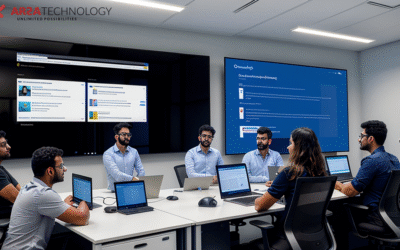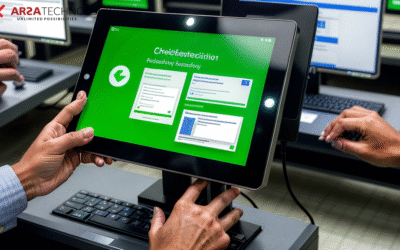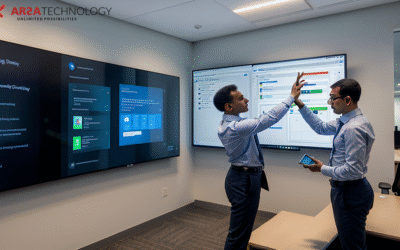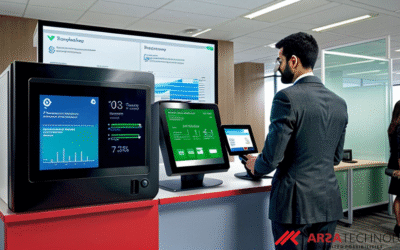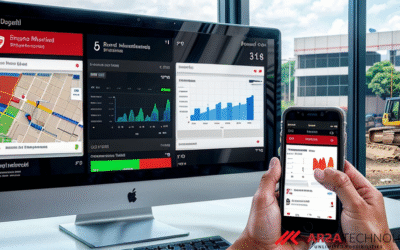Introduction: Overcoming Manual and Inefficient Workflows in the Healthcare Industry
In the high-stakes world of healthcare, continuous learning and training are not just best practices—they are imperatives. From updating clinical protocols and introducing new medical devices to ensuring regulatory compliance, the need for timely and effective educational content is constant. However, the traditional methods for creating this content, particularly the audio components of e-learning modules, are plagued by manual and inefficient workflows.
Organizations often find themselves trapped in a costly and time-consuming cycle of hiring voice actors, scheduling recording sessions, and engaging in lengthy post-production processes. Every minor update to a procedure or piece of patient information requires a complete re-recording to maintain consistency, creating significant bottlenecks and driving up costs. This antiquated approach is not only slow and expensive but also fails to scale, hindering the ability of large healthcare systems to disseminate critical information quickly and uniformly.
This is where a strategic shift towards automation becomes a competitive advantage. ARSA Technology’s Text-to-Speech (TTS) API offers a powerful solution, transforming the entire e-learning content lifecycle. By leveraging a sophisticated speech synthesis SDK, healthcare organizations can decouple audio production from content creation, automating the generation of clear, natural-sounding voiceovers and unlocking unprecedented levels of efficiency, scalability, and accessibility.
The Strategic Disadvantage of Traditional Audio Production
The operational drag caused by manual audio workflows extends far beyond simple inconvenience. It represents a significant strategic liability for modern healthcare providers. Consider the typical process for updating a single training module: a medical expert revises the text, which then must be sent to a voice actor. Studio time is booked, the script is recorded, and the audio files are sent to a production team for editing and integration. This multi-step, human-dependent process can take weeks.
Now, multiply that timeline across hundreds of training modules, patient education pamphlets, and compliance documents that require frequent updates. The costs in both time and budget become astronomical. Furthermore, this model introduces critical challenges:
- Inconsistency: Using different voice actors over time can lead to a disjointed and unprofessional user experience across your learning library.
- Lack of Agility: The inability to make rapid audio updates means that critical new information can be delayed in reaching practitioners and patients.
- Global Scaling Barriers: Localizing content for a global workforce requires hiring and managing voice talent for each language, a logistical and financial nightmare.
- Accessibility Gaps: Without an easy way to provide audio versions of text-based materials, organizations fail to adequately support employees and patients who have visual impairments or prefer auditory learning.
These inefficiencies directly impact patient outcomes and operational excellence. A delay in training on a new device or protocol is not just a process failure; it’s a potential risk to patient safety.
Embracing Automation: The Power of a Voice Synthesis API
A Text-to-Speech API fundamentally changes the content creation paradigm. Instead of treating audio as a separate, manually produced asset, it becomes a dynamic component of the content itself. At its core, a voice synthesis API is a service that your applications can call to convert written text into high-quality spoken audio programmatically.
The integration of ARSA Technology’s speech synthesis SDK into your e-learning platform or content management system (CMS) means that generating a voiceover is as simple as processing a text file. This creates a seamless, automated workflow where updated text is instantly converted into updated audio, eliminating the need for recording studios, voice actors, and manual editing.
The business impact is immediate and profound. Development teams are empowered to build more responsive, accessible, and scalable learning solutions, while content creators can focus on what they do best: producing accurate and effective educational material.
A Blueprint for Integrating the Text-to-Speech API in Healthcare Solutions
Adopting a TTS API is not just a technical upgrade; it’s a strategic business decision. The implementation process is designed to be straightforward, focusing on business logic rather than complex audio engineering.
1. Define the Application and Voice Persona
The first step is to identify the target application. Is it for clinical staff training, patient discharge instructions, or public health announcements? Based on the context, you can select the appropriate voice characteristics. For instance, a calm and empathetic voice is ideal for patient-facing communication, while a clear and authoritative tone may be better for compliance training. Our API offers a range of natural-sounding voices to fit any requirement.
2. Design the Content-to-Audio Workflow
Next, your technical team will design the integration logic. A common approach is to trigger the API whenever a new piece of content is published or updated in your CMS. The system sends the text to the ARSA TTS API and receives an audio file in return, which is then stored and linked to the corresponding content. This ensures that the audio version is always in sync with the text. This process is incredibly fast and efficient. To understand how quickly and accurately text can be converted, you can try the Text-to-Speech API with your own sample text.
3. Leverage Multilingual Capabilities for Global Reach
For international healthcare organizations, our API is a game-changer. A single, approved English text for a training module can be programmatically translated and then fed into the TTS API to generate audio in dozens of languages. This dramatically reduces the cost and complexity of localization, ensuring that your entire global team receives consistent, high-quality training in their native language.
4. Enhance Accessibility Across All Platforms
Integration extends beyond formal e-learning. The API can be used to add “read aloud” functionality to internal knowledge bases, patient portals, and mobile applications. This simple feature makes digital resources instantly accessible to individuals with visual impairments or reading difficulties like dyslexia, reinforcing a commitment to inclusivity.
Expanding the ROI: Use Cases Beyond E-Learning
While dynamic e-learning is a powerful initial application, the strategic value of an integrated TTS API extends across the healthcare ecosystem. The same technology can be repurposed to drive efficiency and improve patient experience in numerous other areas:
- Automated Appointment Reminders: Generate personalized, spoken-word appointment reminders delivered via automated calls.
- Audible Prescription Information: Help reduce medication errors by providing patients with clear, audible instructions for their prescriptions.
- Interactive Voice Response (IVR) Systems: Create more natural and helpful automated phone systems for patient support lines.
- Clinical Trial Communications: Ensure trial participants receive standardized, easy-to-understand information about procedures and protocols.
By viewing the TTS API as a core infrastructure component, you can unlock continuous value. This API is a key part of our full suite of AI APIs, which are designed to help you build smarter, more efficient healthcare solutions.
Conclusion: Your Next Step Towards a Solution
The move away from manual, inefficient audio production is no longer a question of if, but when. For healthcare organizations aiming for operational agility, scalability, and enhanced accessibility, the adoption of a Text-to-Speech API is a critical step forward. By automating the creation of audio content, you eliminate major production bottlenecks, drastically reduce costs, and ensure that timely, accurate information reaches your staff and patients without delay.
ARSA Technology provides the robust, reliable, and high-performance speech synthesis SDK needed to make this transformation a reality. Empower your development teams to build the next generation of healthcare e-learning and communication tools. If you are ready to explore the architectural possibilities and discuss your specific use case, we encourage you to contact our developer support team for a personalized consultation.
Ready to Solve Your Challenges with AI?
Discover how ARSA Technology can help you overcome your toughest business challenges. Get in touch with our team for a personalized demo and a free API trial.


